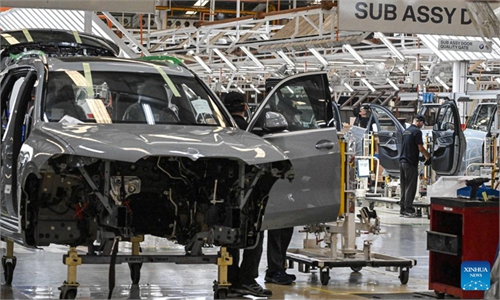BMW moves to hike prices in China, sparking discussion of price increases by other German luxury brands

Workers assemble a BMW car at Gaya Motor Plant in Jakarta, Indonesia, June 6, 2023.(Photo: Xinhua)
As to market gossip that BMW China will withdraw from the fierce price competition in the Chinese mainland market, the group said on Thursday that BMW, in the second half of the year, will focus on “business quality” and help support dealers stabilize sales.
From July, BMW China will reduce sales target to ease operational pressure on dealers and help them tackle short-term market challenges and ease business pressure, BMW told the Global Times in a statement.
The statement came after media reports alleging some BMW dealerships in China have raised prices, with certain car models increasing by 30,000 yuan ($4,133), triggering discussion that the German luxurious brand is retreating from a “price war.”
A salesperson at a BMW store in Shanghai named Yu told the Global Times on Thursday that there have been price hikes in the store. For example, the BMW i3 line-up is now priced at around 220,000 yuan, slightly higher than the previous pricing of 210,000 yuan.
“This was a relatively small price adjustment,” Yu said.
The reported price hike by BMW has also raised concerns that other German car brands, such as Mercedes Benz and Audi, may move to increase their selling prices in China too, after price reductions earlier this year.
A salesperson from a Mercedes Benz dealership told the Global Times on Thursday that they have not increased prices, but they do not rule out the possibility of a price hike next month.
“The store is offering a discount of 120,000 yuan on the purchase of the C-Class, which has helped to keep car prices at a low level compared to last year. However, it has led to some pressure on the store," the salesperson said.
A salesperson from Audi indicated the possibility of reducing the discounts the company has offered to Chinese customers.
In the first half of this year, there has been a wave of price changes in the Chinese car market, particularly in the new-energy vehicle (NEV) sector, with many domestic brands continuously cutting prices to expand their sales.
Facing fierce competition, BMW's sales in the Chinese market have dropped in the first half of the year. BMW (including MINI) sold 375,900 vehicles in the Chinese market in the first half of the year, a decrease of 4.2 percent year-on-year.
Zhang Xiang, secretary general of the International Intelligent Vehicle Engineering Association, told the Global Times on Thursday that the price hike may, to some extent, stimulate some hesitant customers to buy BMW cars.
“The likelihood of Benz and Audi collectively raising prices, following BMW’s move, is low, because the three brands are competitors. Their pricing strategies will take into account market dynamics and competition, and they will individually decide on their own pricing strategies in China,” Zhang said.
Zhang said that in recent years, the market share of German luxury car brands in China is being squeezed, as they are challenged by rapidly rising Chinese electric vehicle brands. And the seemingly irreversible market trend is that the gasoline-powered traditional vehicles will continue to lose market share in China, where German brands own a clear comparative advantage.
In June, nearly half of all new cars sold in China were electric or hybrid vehicles, up from one-third market penetration a year earlier. In the luxury car market, almost 30 percent of vehicles sold were NEVs, according to data from the China Passenger Car Association.

